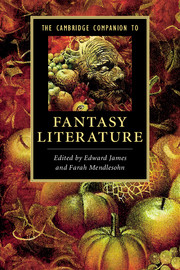Book contents
20 - Historical fantasy
from PART III - CLUSTERS
Published online by Cambridge University Press: 28 March 2012
Summary
What is the relationship between fantasy and history in historical fantasy novels? The historical fantasy is a hybrid of two seemingly opposed modes, fantasy, with its explicit rejection of consensus reality, and historical fiction, a genre grounded in realism and historically accurate events. Jana French, in her work Fantastic Histories: A Dialogic Approach to a Narrative Hybrid, argues repeatedly that the tension in historical fantasy comes from the opposition of two extremes, ‘a clashing of two vastly different discursive mediations of the historical world’. She writes that such a clash is generative of insights into the nature of historical writing precisely because such an extreme contrast ‘radically destabilize[s] the normal contract between reader and text which tells us what kind of novel we are reading’ (5). Thus French takes an extreme separation, or even opposition, between history and fantasy to be normative, and historical fantasies to be remarkable precisely because they put two radically dissimilar discourses into dialogue. But K. L. Maund in John Clute's Encyclopedia of Fantasy points out that ‘Fantasy as a genre is almost inextricably bound up with history and ideas of history,’ relating fantasy to the historical swashbucklers of H. Rider Haggard and others, and noting that a number of fantasy authors such as Judith Tarr and fantasy scholars such as Farah Mendlesohn have been trained as historians. Writers of historical fiction and of fantasy must engage in world-building, in constructing and familiarizing their readers with a world foreign to their own and yet fully realized as a world complete unto itself with its own mores, customs and tensions. Thus in historical development, individuals and techniques, fantasy and historical fiction are not as polarized as French claims.
- Type
- Chapter
- Information
- The Cambridge Companion to Fantasy Literature , pp. 236 - 247Publisher: Cambridge University PressPrint publication year: 2012
- 2
- Cited by



